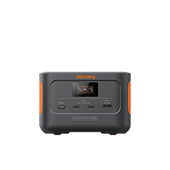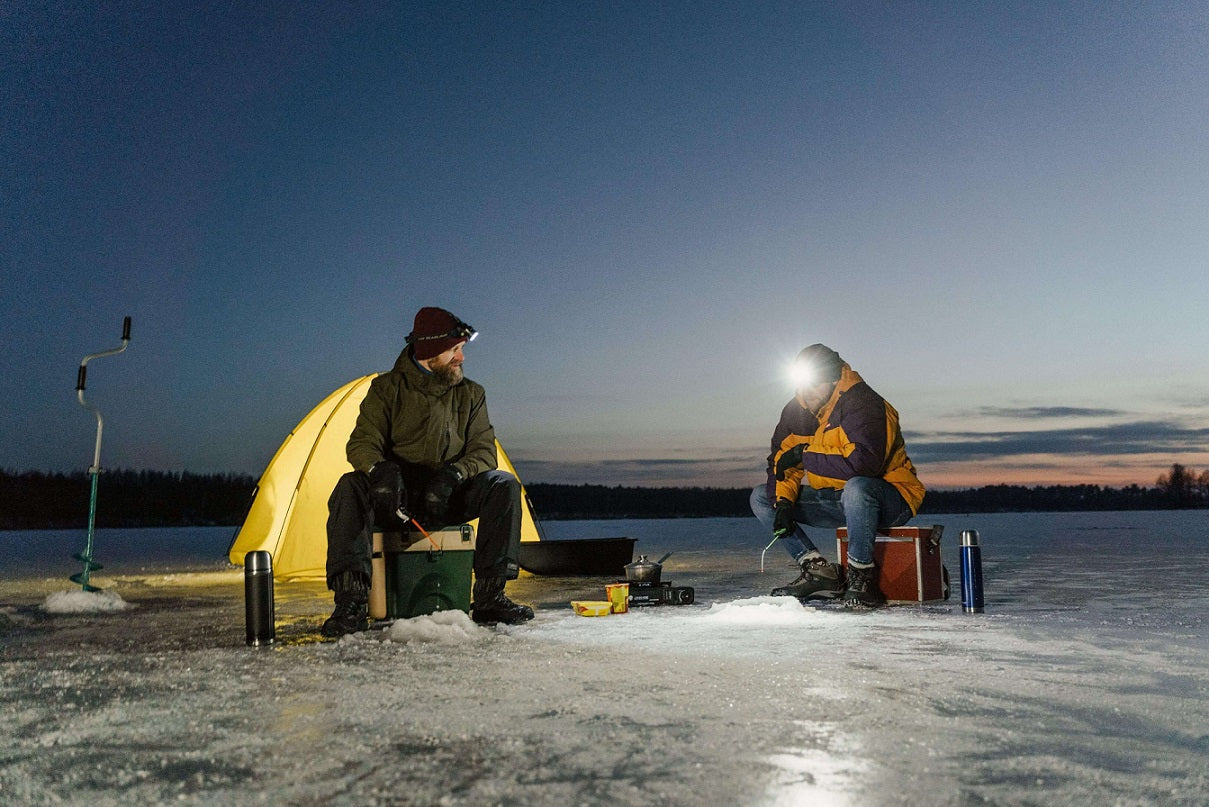Fishing is a popular sport in the UK, but before you cast your line, you need to understand the fishing licensing requirements. A license is required to fish for trout, coarse fish, or salmon in most freshwater and tidal waters.
License rates vary depending on the species you want to catch and the period of the permit, which ranges from daily to annual. In addition, licenses include rod limitations and stringent rules to safeguard fish stocks and habitats. This article will show you all you need to know about fishing licenses in the UK, including costs, types, validity periods, and where to acquire them.
Furthermore, during your fishing trips, a reliable portable power source can help you stay connected with others, locate fish with an electric fish finder, or even navigate your route. We highly recommend the Jackery Portable Power Station for your fishing trip, thanks to its higher capacity and portability.
|
Key Takeaways: |
|
- A fishing license is required for most freshwater and tidal fishing in the UK for anyone aged 12 and over. - License fees vary by species targeted—coarse fish, trout, or salmon—and license duration, including daily, weekly, and annual options. - The standard rod license allows up to three rods, but local waters may have additional restrictions. - Always check local rules and water-specific restrictions to ensure compliance with rod limits and permit requirements. - We recommend the Jackery Explorer 300 Plus portable power station to charge your electronics and devices outdoors. |
What Is a Fishing License? What Does It Allow You to Do?
Anyone over the age of 12 who wants to fish with a rod and line in most freshwater and some tidal waters in England, Scotland and Wales must have a fishing license. It allows you to fish for species such as trout, coarse fish, and salmon in specific waters without infringing any laws. The license allows you to fish in rivers, canals, lakes and reservoirs, but it does not grant you the freedom to fish wherever you wish. You must also obtain authorisation from the landowner or water owner.
A fishing license allows you to fish for particular species with a rod and line legally, but it does not cover other fishing methods or types of water. For example, marine fishing above the tidal limit typically does not require a license. The license is required to manage fish stocks and support conservation initiatives.
In short, a fishing license allows you to fish with a rod and line in legal freshwater and tidal waters as long as you obey local restrictions and have landowner permission.
When Do You Need a Fishing License in the UK?
To fish with a rod and line in most freshwater and tidal waters in England, Scotland and Wales, you must first obtain a fishing license. This covers fishing on rivers, canals, lakes, and reservoirs. To fish lawfully in these waters, anyone above the age of 12 must have a valid license.
There are a few circumstances where a license is unnecessary. For example, marine fishing above the tidal limit does not require a permit. Additionally, fishing on private land or in waters where the proprietor does not require a license may not require one, but it is usually a good idea to verify.
It is forbidden to fish in these waters for trout, coarse fish or salmon without a license. The permit ensures the sustainability of fish populations and contributes to environmental protection. In brief, if you want to fish in freshwater or tidal waterways in the UK using a rod and line, you must have a license unless you qualify for an exemption.

What Types of Fishing Licenses Are There? What Are the Rod Limits?
If you plan to go fishing in the UK, you should be aware of the many sorts of fishing permits available as well as the laws governing how many rods you can use. The right license depends on how frequently you fish and what species you intend to capture. Knowing the rod restrictions will also help you stay within the law and enjoy fishing responsibly.
What Different Types of Fishing Licenses Can You Get?
There are three types of fishing licenses available: annual, weekly, and daily. An annual rod permit allows you to fish for trout, coarse fish, or salmon all year, whilst weekly and daily licenses are suitable if you only want to fish for a short time. This flexibility allows anglers to select a license that fits their fishing frequency and budget.
Are There Different Licenses for Different Fish?
Yes. If you wish to fish for salmon or sea trout, you'll need a special salmon license, which can be obtained annually or for a shorter time period. This is necessary in addition to a basic rod license. The salmon license serves to manage fishing for particular species while also supporting conservation initiatives.
We also have some fishing guides you are interested in:
What Are the Rod Limits For License Holders?
A standard rod license allows the holder to use up to three rods at one time. However, this can vary based on the water body and local regulations. Some waters may have tougher limits or require additional permissions, so verify the rules where you intend to fish.
Can You Use More Than Three Rods?
Most licenses allow for the use of up to three rods at the same time, although certain waters have unique limits or additional laws that may limit this number. Always check with local authorities or the water owner before going fishing.
Why Are There Different License Types and Rod Limits?
Different license lengths and rod limitations help to manage fish stocks and promote sustainable fishing practices. They provide equitable access to fishing opportunities while safeguarding aquatic habitats.

How Much Is a Fishing License in the UK?
Knowing the cost of a fishing license is one of the most crucial things to take before going fishing in the UK. The cost depends on the type of license you require and the duration for which you need it. The government sets license costs, which might vary from year to year, so it's always a good idea to check the latest prices before purchasing.
What Are the Current License Fees for Fishing in England?
Fishing permits are classified primarily by the species to be caught and the period of the license. For example, coarse fish, trout, and salmon licenses have separate requirements and fees. You can get licenses for a single day, a week, or a year, depending on your fishing intentions.
The table below summarises the current license fees in England: UK Fishing license Fees (Effective from April 1, 2025)
|
License Type |
Duration |
Price |
Eligibility & Notes |
|
Trout and Coarse (up to 2 rods) |
12 months |
£36.60 |
Standard license for non-migratory trout and coarse fish |
|
Trout and Coarse (up to 3 rods) |
12 months |
£55.30 |
Required if using 3 rods simultaneously |
|
Salmon and Sea Trout |
12 months |
£93.10 |
Covers migratory salmon and sea trout |
|
Concessionary (Senior 66+ / Disabled) |
12 months |
£24.50 |
Available for seniors aged 66 and over and individuals with a Blue Badge |
|
Junior (Ages 13–16) |
12 months |
Free |
Mandatory for ages 13–16; free of charge |
|
1-Day license (Trout and Coarse) |
1 day |
£7.30 |
Ideal for occasional anglers |
|
8-Day license (Trout and Coarse) |
8 consecutive days |
£14.70 |
Suitable for short-term fishing trips |
Note*: Children under 13 do not require a fishing license.
(Data Source: UK Government)
What Does Each License Cover?
The Adult Coarse Fishing license permits you to catch coarse fish like carp, roach, and perch in most freshwater bodies. The Adult Trout Fishing license is only valid for freshwater trout fishing, whereas the Adult Salmon Fishing license is required for both salmon and sea trout fishing. The Combined Rod license is the most comprehensive, allowing you to fish for all three types of fish throughout the year.
Weekly and daily licenses offer flexibility to infrequent anglers who may not want to commit to a yearly license. These licenses include trout and coarse fish but not salmon fishing. Children under the age of 16 are exempt from paying a license and can fish freely, provided they are accompanied by the proper authorities.
Where Can You Purchase a Fishing License?
Fishing licenses are available online via the official government website, at local post offices, and at a variety of retail locations that offer fishing tackle and permits. Purchasing a license before fishing guarantees that you follow the law and contribute to fishery protection.
Why Do License Costs Differ?
The license fees vary depending on the length of time they cover and the species you can catch. Salmon licenses, for example, are the same price as coarse or trout licenses but are sold separately, as managing salmon fisheries necessitates distinct conservation measures. Short-term licenses are less expensive, making them suitable for casual or holiday fishermen.

How Long Does a Fishing License Last in the UK?
The length of a fishing license is determined by the type of permit you acquire and your fishing requirements. The United Kingdom offers fishing licenses ranging from short-term daily permits to annual licenses, providing flexibility for both casual anglers and habitual fishermen.
What Are the Different License Duration Available?
There are three types of fishing licenses available: daily, weekly, and annual. A daily license allows you to fish lawfully for one day and is ideal for individuals who fish occasionally or while visiting the area. The weekly license is valid for eight consecutive days, providing you with additional time to fish without committing to a full year.
An annual license is available for individuals who fish regularly or desire year-round access. This license is valid for twelve months from the date of purchase and provides the most extensive fishing rights, including options for coarse fish, trout, and salmon licenses.
When Does an Annual License Expire?
An annual fishing license is valid for exactly one year from the date of purchase. For example, if you acquire your license on June 1, it will expire at midnight on May 31 of the following year. This ensures that you have a full 12 months of legal fishing from the date of purchase.
Can You Renew a License Before It Expires?
Yes, you can renew your fishing license before it expires to avoid gaps in coverage. Many anglers prefer to renew their licenses online using the official government website, which makes the process more efficient and convenient.
What Happens If You Fish Without a Valid License?
Fishing without a valid license is prohibited and may result in fines or prosecution. If you intend to fish in freshwater or tidal waters, you must always have a current license.
Why Are Shorter-Term Licenses Available?
Anglers who only fish rarely or visit specific regions for a short period of time might benefit from daily and weekly licenses, which are both economical and versatile. They allow more people to enjoy fishing without the need for an annual license.
Jackery Portable Power Station for Fishing
Many modern anglers rely on electronic fish finders. A Jackery Portable Power Station ensures these devices stay powered throughout your session, helping you locate fish and underwater structures effectively. If you use a remote-controlled bait boat, a Jackery can efficiently recharge its batteries, ensuring you can deploy bait and rigs accurately all day (or night) long.
Whether it's a headlamp for setting up in the dark, a bivvy light for overnight sessions, or a floodlight for tying knots, reliable illumination is key. Jackery can power these directly or recharge their internal batteries.
Unlike noisy petrol generators, Jackery Portable Power Stations operate silently. This is crucial for fishing, as loud noises can scare fish away. It also maintains the peace and tranquillity of the natural environment, respecting other anglers and wildlife.
Pairing a Portable Power Station with Jackery Solar Panels allows you to go off-grid truly. You can recharge the power station using sunlight, ensuring continuous power over multi-day sessions without needing a mains hook-up. This is particularly beneficial for longer trips to remote fisheries.
Jackery Explorer 300 Plus
The Jackery Explorer 300 Plus is an excellent choice for many fishing scenarios in the UK, particularly for day trips or overnight sessions. It strikes an outstanding balance between portability, sufficient power for essential gear, and Jackery's renowned reliability.

Compact and Highly Portable
Weighing in at only 8.27 lbs (3.75 kg), the Explorer 300 Plus is very easy to carry. This is crucial for UK fishing, where you might have to walk a fair distance to reach your preferred spot along a riverbank, lake, or even a coastal mark. It fits easily into a fishing rucksack or tackle bag without adding significant bulk. Its small footprint (9.1 x 6.1 x 6.6 inches) means it won't take up much room in a small fishing bivvy, boat, or car boot, leaving more space for your actual fishing gear.
Sufficient Power for Common Fishing Needs
A 300W AC output, 600W surge power, and 288Wh LiFePO4 battery are ample for charging typical fishing electronics over a day or two. Think of multiple charges for phones and tablets, headlamps and lights, fish finders, and more. It includes AC, USB-A, and high-wattage USB-C (100W) ports, ensuring compatibility with almost all your fishing and personal devices. The 100W USB-C is particularly good for fast-charging modern smartphones and laptops.
No Noise or Fumes
UK fisheries, rivers, and lakes are often peaceful environments. A silent, emission-free power source is essential to avoid disturbing fish or other anglers. The Jackery 300 Plus is virtually silent, preserving the tranquillity of your fishing experience. Using solar-rechargeable power aligns with the "Leave No Trace" principles, which are highly valued by responsible anglers in the UK. You're not polluting the air or creating noise.
Robust Build
Jackery products are built to withstand outdoor conditions. The 300 Plus features fire-retardant material, shock resistance, and advanced BMS for safety, which is reassuring when you're out in potentially damp or rugged environments. It can operate in temperatures from 14F to 113F (-10C to 45C), covering the typical range of UK fishing seasons.
FAQs
The following are the frequently asked questions about fishing licenses in the UK.
1. How much is a UK fishing license?
As of 2025, the cost of a UK fishing permit varies depending on its type and duration. An annual license for trout and coarse fishing with up to two rods costs £36.80, while a three-rod license costs £55.30. Salmon and sea trout licenses cost £93.10 per year. Short-term choices include an 8-day license for £14.70 and a 1-day license for £7.30. Concessions are available: seniors (aged 66 and above) and disabled individuals pay £24.50 for a two-rod license, while youngsters aged 13 to 16 can receive one for free.
2. Can you still buy a fishing license at the Post Office?
No, starting on January 16, 2023, rod fishing licenses are no longer available at Post Office locations. This adjustment was made in response to a considerable decrease in sales at these locations, as the majority of anglers now purchase licenses online.
3. Where to buy a fishing license in the UK?
Fishing licenses are available for purchase online at gov.uk/fishing-licenses, the official UK government website. Alternatively, you can purchase a license by calling the Environment Agency at 0344 800 5386, Monday through Friday between 8 a.m. and 6 p.m.
4. Do I need a license to fish in the UK?
Yes, everyone above the age of 13 in England and Wales must hold a rod fishing license to use a rod and line to catch salmon, trout, freshwater fish, smelt or eel in rivers, lakes and other bodies of freshwater. This restriction applies even to private territory, such as angling club waters or private fishing lakes.
5. Can anyone fish in UK waters?
While fishing is accessible to many, certain restrictions apply. Anglers must have the required licenses and approvals. Freshwater fishing in England and Wales requires a rod license for people aged 13 and up. Additionally, authorisation from the landowner or angling club is required to fish on private waters. Sea fishing from public places such as beaches and rocks often does not require a license, but some piers and harbours may have specific laws or permissions.
Final Thoughts
Obtaining the proper fishing license is essential for every angler in the UK who wants to fish lawfully and promote sustainable fishing practices. Knowing the fees, license categories, rod limitations, and license terms enables you to select the most suitable permit for your needs.
Whether you are a casual visitor or a habitual fisherman, there are license choices to suit you. Always get your permit from an official supplier to avoid penalties and help with fishery conservation. Following these recommendations allows you to enjoy fishing responsibly while also safeguarding the UK's aquatic ecosystems for future generations.






























































